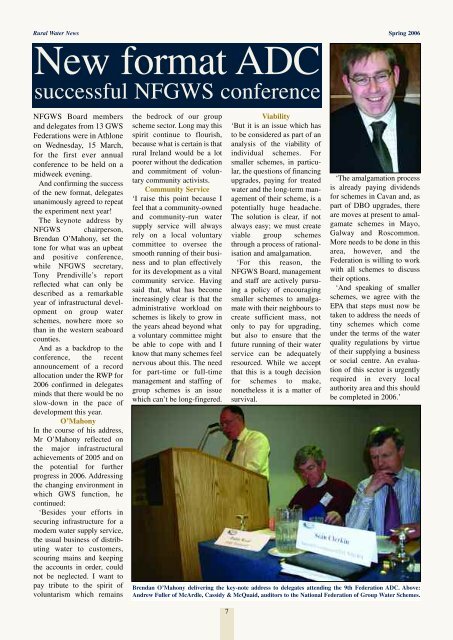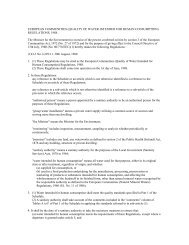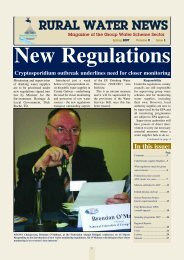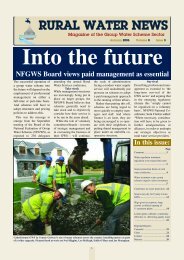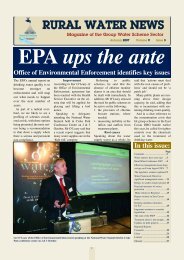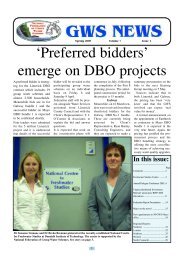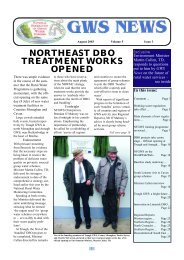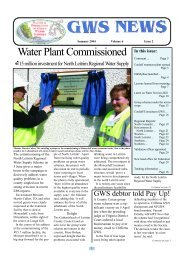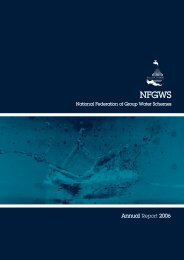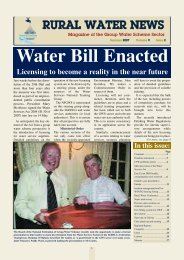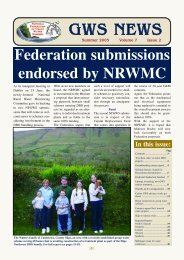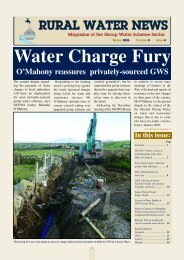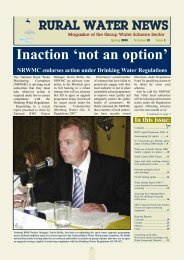Subsidy Review
Spring 2006 - nfgws
Spring 2006 - nfgws
Create successful ePaper yourself
Turn your PDF publications into a flip-book with our unique Google optimized e-Paper software.
Rural Water News Spring 2006<br />
New format ADC<br />
successful NFGWS conference<br />
NFGWS Board members<br />
and delegates from 13 GWS<br />
Federations were in Athlone<br />
on Wednesday, 15 March,<br />
for the first ever annual<br />
conference to be held on a<br />
midweek evening.<br />
And confirming the success<br />
of the new format, delegates<br />
unanimously agreed to repeat<br />
the experiment next year!<br />
The keynote address by<br />
NFGWS chairperson,<br />
Brendan O’Mahony, set the<br />
tone for what was an upbeat<br />
and positive conference,<br />
while NFGWS secretary,<br />
Tony Prendiville’s report<br />
reflected what can only be<br />
described as a remarkable<br />
year of infrastructural development<br />
on group water<br />
schemes, nowhere more so<br />
than in the western seaboard<br />
counties.<br />
And as a backdrop to the<br />
conference, the recent<br />
announcement of a record<br />
allocation under the RWP for<br />
2006 confirmed in delegates<br />
minds that there would be no<br />
slow-down in the pace of<br />
development this year.<br />
O’Mahony<br />
In the course of his address,<br />
Mr O’Mahony reflected on<br />
the major infrastructural<br />
achievements of 2005 and on<br />
the potential for further<br />
progress in 2006. Addressing<br />
the changing environment in<br />
which GWS function, he<br />
continued:<br />
‘Besides your efforts in<br />
securing infrastructure for a<br />
modern water supply service,<br />
the usual business of distributing<br />
water to customers,<br />
scouring mains and keeping<br />
the accounts in order, could<br />
not be neglected. I want to<br />
pay tribute to the spirit of<br />
voluntarism which remains<br />
the bedrock of our group<br />
scheme sector. Long may this<br />
spirit continue to flourish,<br />
because what is certain is that<br />
rural Ireland would be a lot<br />
poorer without the dedication<br />
and commitment of voluntary<br />
community activists.<br />
Community Service<br />
‘I raise this point because I<br />
feel that a community-owned<br />
and community-run water<br />
supply service will always<br />
rely on a local voluntary<br />
committee to oversee the<br />
smooth running of their business<br />
and to plan effectively<br />
for its development as a vital<br />
community service. Having<br />
said that, what has become<br />
increasingly clear is that the<br />
administrative workload on<br />
schemes is likely to grow in<br />
the years ahead beyond what<br />
a voluntary committee might<br />
be able to cope with and I<br />
know that many schemes feel<br />
nervous about this. The need<br />
for part-time or full-time<br />
management and staffing of<br />
group schemes is an issue<br />
which can’t be long-fingered.<br />
Viability<br />
‘But it is an issue which has<br />
to be considered as part of an<br />
analysis of the viability of<br />
individual schemes. For<br />
smaller schemes, in particular,<br />
the questions of financing<br />
upgrades, paying for treated<br />
water and the long-term management<br />
of their scheme, is a<br />
potentially huge headache.<br />
The solution is clear, if not<br />
always easy; we must create<br />
viable group schemes<br />
through a process of rationalisation<br />
and amalgamation.<br />
‘For this reason, the<br />
NFGWS Board, management<br />
and staff are actively pursuing<br />
a policy of encouraging<br />
smaller schemes to amalgamate<br />
with their neighbours to<br />
create sufficient mass, not<br />
only to pay for upgrading,<br />
but also to ensure that the<br />
future running of their water<br />
service can be adequately<br />
resourced. While we accept<br />
that this is a tough decision<br />
for schemes to make,<br />
nonetheless it is a matter of<br />
survival.<br />
‘The amalgamation process<br />
is already paying dividends<br />
for schemes in Cavan and, as<br />
part of DBO upgrades, there<br />
are moves at present to amalgamate<br />
schemes in Mayo,<br />
Galway and Roscommon.<br />
More needs to be done in this<br />
area, however, and the<br />
Federation is willing to work<br />
with all schemes to discuss<br />
their options.<br />
‘And speaking of smaller<br />
schemes, we agree with the<br />
EPA that steps must now be<br />
taken to address the needs of<br />
tiny schemes which come<br />
under the terms of the water<br />
quality regulations by virtue<br />
of their supplying a business<br />
or social centre. An evaluation<br />
of this sector is urgently<br />
required in every local<br />
authority area and this should<br />
be completed in 2006.’<br />
Brendan O’Mahony delivering the key-note address to delegates attending the 9th Federation ADC. Above:<br />
Andrew Fuller of McArdle, Cassidy & McQuaid, auditors to the National Federation of Group Water Schemes.<br />
7


